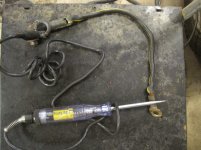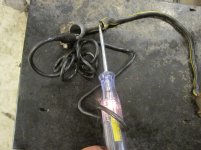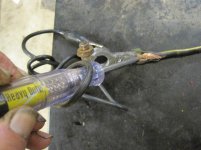docrocky
Silver Member
- Joined
- Jul 18, 2011
- Messages
- 207
- Location
- NW Ohio and SE Michigan
- Tractor
- Oliver 880, Ford 8N, Ford 9N, Farmall Super C, MF 205, Ford 4400 FEL, Ford 4500 FEL/BH, Cat D-6 Dozer(1957)
I would like to share with the forum a very unusual occurrence. I have just completed replacing a cracked head on my MF 205 diesel (Toyosha 2 cylinder) engine. Did all the necessary tasks such as reseat the valves, new gaskets, checked out cylinders and bearings etc. My engine re builder and I hooked up every thing back as needed and used our digital photos as check list. The engine turned nicely manually. We then hooked up a brand new battery and gave the tractor a try. Turning on the key, the engine oil light flickered on but when the key turned to the start position, nothing. Checking all the fuses and making sure the clutch safety was properly depressed, nothing. Battery checked out but to insure even used the battery charger to supplement the starting power, but again nothing. Tried jumping the starter at its terminals, but again nothing. I then checked the + battery cable to the solenoid with a test lite grounded to the engine and there was current to the solenoid. I then went to the instrument panel to see if I could check out the ignition switch but this was very difficult to evaluate since I did not have a wiring diagram. I then removed the starter and bypassed the solenoid and it would engage with power. I took the starter to a friend's electrical shop (starters, generators, alt repairs) and replaced the solenoid, the brushes etc. Worked beautifully on the bench. I returned it to the tractor and after recharging the battery gave it a test, again nothing. I then repeated jumping it at the posts and again nothing. After repeated testing as many switches as I could with a continuity test light still could find no fault. I then started checking grounds especially at the battery terminal to the frame. I cleaned and removed all potential corrosion but still no response.
Now to shorten this narrative, I used the test light touching the negative battery terminal to the frame and had strong current. I then connected the test light to the frame connection of the negative battery cable, and no current. The cable was totally intact with good post and frame contacts. I then substituted a different negative cable and lo the current passed. I then turned on the key, lights were bright on the dash and the started engaged. Problem solved. It was a faulty battery cable whose external appearance revealed no faults. I then opened the insulating cover and still found no break in the continuity of the copper fibers. I tested the cable with the continuity test light and the current would not pass within a fraction of the cable attachment to the post.
I'll try to attach some photos of what I encountered. I am sure some of you may have encountered this problem but for an ametur like me and a few others we haven't. If there is a lesson to learn from this it is to carefully check your grounds.
Now to shorten this narrative, I used the test light touching the negative battery terminal to the frame and had strong current. I then connected the test light to the frame connection of the negative battery cable, and no current. The cable was totally intact with good post and frame contacts. I then substituted a different negative cable and lo the current passed. I then turned on the key, lights were bright on the dash and the started engaged. Problem solved. It was a faulty battery cable whose external appearance revealed no faults. I then opened the insulating cover and still found no break in the continuity of the copper fibers. I tested the cable with the continuity test light and the current would not pass within a fraction of the cable attachment to the post.
I'll try to attach some photos of what I encountered. I am sure some of you may have encountered this problem but for an ametur like me and a few others we haven't. If there is a lesson to learn from this it is to carefully check your grounds.


